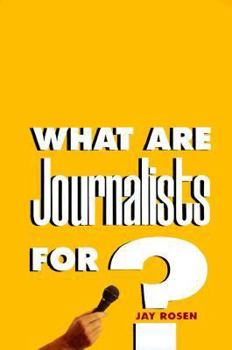What Are Journalists For?
Select Format
Select Condition 
Book Overview
American journalists in the 1990s confronted disturbing trends--an erosion of trust in the news media, weakening demand for serious news, flagging interest in politics and civic affairs, and a... This description may be from another edition of this product.
Format:Hardcover
Language:English
ISBN:0300078234
ISBN13:9780300078237
Release Date:November 1999
Publisher:Yale University Press
Length:338 Pages
Weight:1.47 lbs.
Dimensions:1.1" x 6.4" x 9.5"
Customer Reviews
3 ratings
A superb, serious and constructive book!
Published by Thriftbooks.com User , 24 years ago
Many professors probably dream of launching intellectual movements that change things for the better. Jay Rosen of New York University, author of "What Are Journalists For?" has actually done it. His superb, serious and constructive book tells the story of public journalism, a movement aimed at questioning the conventional wisdom of journalists and at re-centering their efforts. Public journalism encouraged journalists to be "for" richer democratic discourse, for example, and to reflect the real concerns of citizens in their stories, rather than each election year's set of "issues" as devised by politicians. Controversial from the start, the movement has had real impact: Sneered at by haughty power-journalists in some major metropolitan media, public journalism was embraced in more open-minded places like Kansas, Florida and North Carolina, and the results have been both interesting and encouraging. In its diagnosis of what's wrong with today's media and its search for constructive alternatives, Rosen's book is fascinating. (With James Fallows' earlier "Breaking the News," this highly readable book is essential information for citizens who care about the way the media work.) And in its careful, fair, thoughtful and modest account of the public-journalism movement, author Rosen actually creates a model of the kind of journalism he advocates--- and teaches.
Excellent study of public journalism
Published by Thriftbooks.com User , 25 years ago
The title of Jay Rosen's excellent new book is deceptively complex, especially in the absence of the colon embedded in most academic titles. "What are Journalists For?" asks two questions: What is the utility of journalists and what do they stand for. What are journalists for? Rosen argues, among other things, that journalists should be _for_ democracy.In the face of a declining civic life and a growing public distrust of journalists, a number of reporters have realized that they could (or perhaps should) try to change this. This idea is called public journalism, a notion that has been debated in academia and in the press for a decade. Rosen, the intellectual leader of public journalism, could have used the publication of his book as an opportunity to fight with the more rabid of his critics. The views of the critics are discussed and evaluated with more thoughtfulness than their tenor might merit. But Rosen has done far more here: he has written an engaging and provocative book that is at once history, analysis and a prescription for change. Anyone who has taken even a passing interest in Rosen's enterprise has been waiting for the publication of this book with anticipation. Readers will find that it was well worth the wait. It is one of the most important books about journalism of our time.
Needed: Journalistic Diversity
Published by Thriftbooks.com User , 25 years ago
For almost a decade, the diverse journalistic experiments collectively known as "public journalism" or "civic journalism" have elicited hysterical overreactions from established pundits such as David Remnick, Michael Gartner, and Michael Kelly. They have raised fears that if journalists at all levels ask the simple question "what is my role in my community?" they are likely to tumble down a slippery slope of self-importance and compromised ethics.In his book, _What are Journalists For?,_ Jay Rosen summarizes the various attempts journalists have made to connect with their readers in a meaningful way. Rosen is anything but boastful about the success of public journalism. He is frank about the shortcomings of some experiments. He generously credits the practictioners over the theorists -- a rare stance for an academic in our age.Most importantly, Rosen grants his critics ample space to air their concerns. Then he gently answers his critics. Again, this is a rare move for an academic. It's an even rarer move within the cacaphony of voices that attempt to pass for public deliberation in this culture. What becomes painfully clear from the accounts of the enemies of public journalism is that they all deeply believe their role in the culture is to be as cynical as possible, so that through their work, "we won't get fooled again." However, the roles of New York- and Washington-based political journalists are very different than the roles of those who cover school boards in Round Rock, Texas or Augusta, Maine.The answer to Rosen's titular question is that journalists are for many things. There is no single way to be an effective and responsible journalist. If we learn anything from the experiments that make up public journalism, it that we need experimentation. We should not be afraid to fail, not be afraid to err. Our political culture is so poor and malnourished that surely something must change. Rosen and the public journalists he counsels and describes are the first to concede that they do not have all the answers to the question, "what are journalists for?" But 10 years ago, no one dared ask that question.





